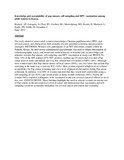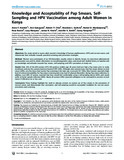| dc.contributor.author | Rositch, AF | |
| dc.contributor.author | Gatuguta, A | |
| dc.contributor.author | Choi, RY | |
| dc.contributor.author | Guthrie, BL | |
| dc.contributor.author | Mackelprang, RD | |
| dc.contributor.author | Bosire, R | |
| dc.contributor.author | Manyara, L | |
| dc.contributor.author | Kiarie, JN | |
| dc.contributor.author | Smith, JS | |
| dc.contributor.author | Farquhar, C | |
| dc.date.accessioned | 2013-06-12T12:06:42Z | |
| dc.date.issued | 2012 | |
| dc.identifier.citation | Knowledge and acceptability of pap smears, self-sampling and HPV vaccination among adult women in Kenya. Rositch AF, Gatuguta A, Choi RY, Guthrie BL, Mackelprang RD, Bosire R, Manyara L, Kiarie JN, Smith JS, Farquhar C. PLoS One. 2012;7(7):e40766. doi: 10.1371/journal.pone.0040766. Epub 2012 Jul 10. | en |
| dc.identifier.uri | http://www.ncbi.nlm.nih.gov/pubmed/22808257 | |
| dc.identifier.uri | http://erepository.uonbi.ac.ke:8080/xmlui/handle/123456789/32276 | |
| dc.description.abstract | Our study aimed to assess adult women's knowledge of human papillomavirus (HPV) and cervical cancer, and characterize their attitudes towards potential screening and prevention strategies.
METHODS:
Women were participants of an HIV-discordant couples cohort in Nairobi, Kenya. An interviewer-administered questionnaire was used to obtain information on sociodemographic status, and sexual and medical history at baseline and on knowledge and attitudes towards Pap smears, self-sampling, and HPV vaccination at study exit.
RESULTS:
Only 14% of the 409 women (67% HIV-positive; median age 29 years) had ever had a Pap smear prior to study enrollment and very few women had ever heard of HPV (18%). Although most women knew that Pap smears detect cervical cancer (69%), very few knew that routine Pap screening is the main way to prevent ICC (18%). Most women reported a high level of cultural acceptability for Pap smear screening and a low level of physical discomfort during Pap smear collection. In addition, over 80% of women reported that they would feel comfortable using a self-sampling device (82%) and would prefer at-home sample collection (84%). Nearly all women (94%) reported willingness to be vaccinated to prevent cervical cancer if offered at no or low cost.
CONCLUSIONS:
These findings highlight the need to educate women on routine use of Pap smears in the prevention of cervical cancer and demonstrate that vaccination and self-sampling would be acceptable modalities for cervical cancer prevention and screening. | en |
| dc.language.iso | en | en |
| dc.title | Knowledge and acceptability of pap smears, self-sampling and HPV vaccination among adult women in Kenya. | en |
| dc.type | Article | en |
| local.publisher | Epidemiology, Johns Hopkins Bloomberg School of Public Health, Baltimore, Maryland, United States of America | en |


